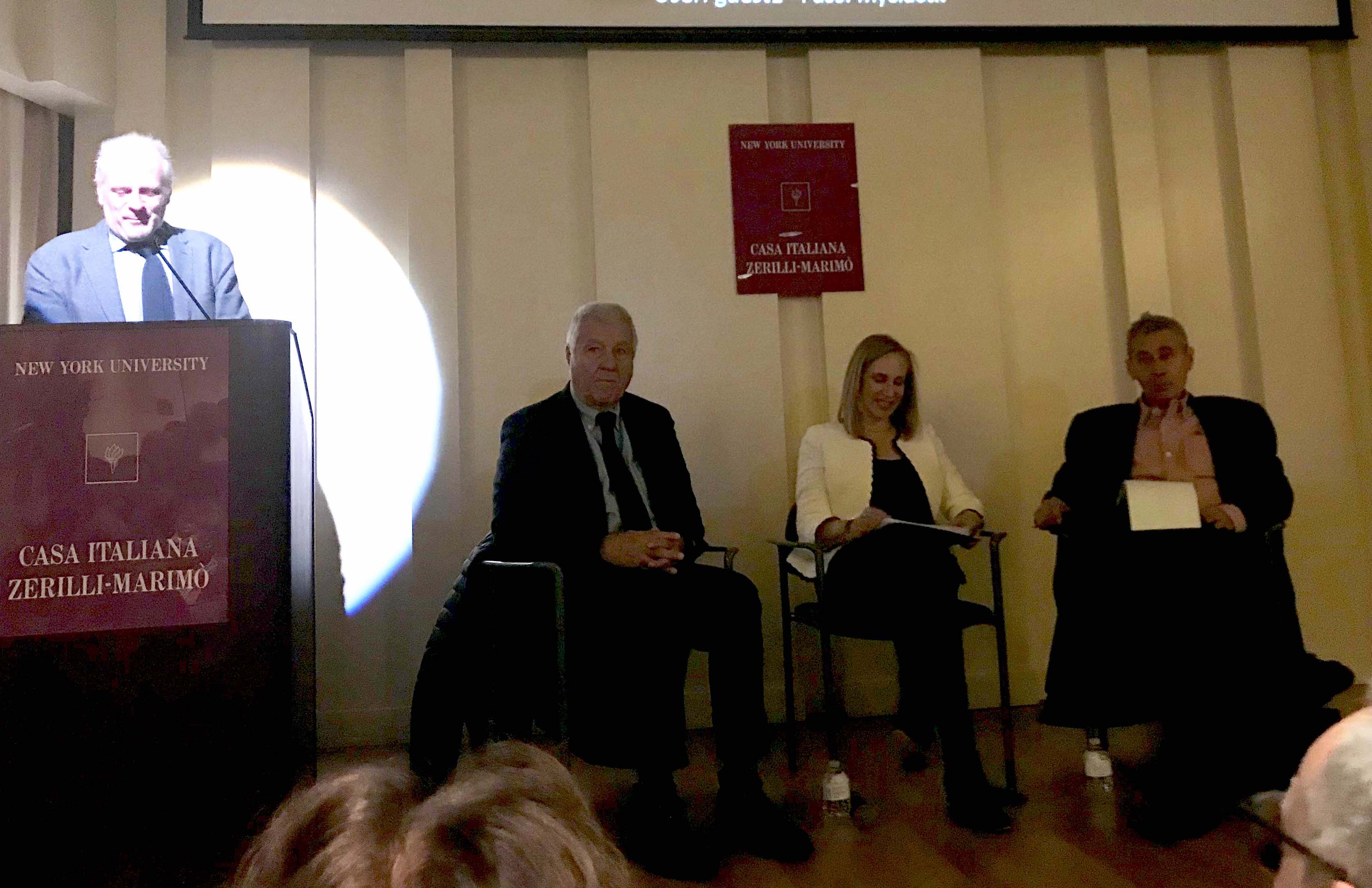Let’s pretend we took a random poll through New York City streets, asking random individuals for an opinion about fascism. How many would have anything positive to say? Most likely very few, if any at all. That is because in 2018, more than half a century away from the fall of the greatest fascist regimes in history, fascism is generally (and rightfully) regarded as an oppressive, philistine and backwards way of government. After being exposed to the unrelenting tide of history, this way of thinking about fascism is beyond justified, especially in the country so instrumental to preventing its expansion. However, the American-drawn picture of fascism has not always been painted with such negative strokes. In a valiant effort to show just how differently fascism was once depicted in the United States, Italian historian Mauro Canali held a brilliant talk at NYU’s Casa Italiana Zerilli-Marimò last night, shedding light on the disjointed portrait.

The panel, presented by Casa Italiana Director Stefano Albertini and composed of Mr. Canali, History giant and NYU Italian Studies professor Ruth Ben-Ghiat, and illustrious journalist and Columbia professor Alexandre Stille, was arranged to discuss the implication of Canali’s latest book La Scoperta dell’Italia: Il fascismo raccontato dai corrispondenti americani, in english The Discovery of Italy: Fascism as told by American correspondents. The three panelists, in a refreshing mixture of english and Italian, take their captivated audience through the history of American coverage of Benito Mussolini’s ascent to power and regime. To begin with, Mauro himself depicts just how novel Mussolini was to American journalists, as a reality. At the wake of Italy’s red-scare spanning the end of the 1910’s and start of the 1920’s, journalists had previously been exposed to a country rampant with instability, and still recovering from the devastation brought on by the Great War. When Mussolini rose to power, American journalists “had very little reference” with which to analyze his initial policies. They were hence limited, by communist fear at home and lack of frame of reference abroad, to what they saw and experienced. What they saw, especially throughout the years that saw Mussolini transition from prime minister to dictator, was a country that, in the face of communism, adopted an alternative, more America-friendly political system that seemed to effectively address many of the issues that had caused such disorder years prior.
At first, then, as Mauro puts its “Mussolini was the man that fixed Italy while drawing it away from the evils of communism, providing an alternative that was extremely appreciable by American people and legislators alike”. What the panel (and audience) finds curious, is that the conception of Mussolini did not change nor did it tend towards negativity after his March on Rome. The march, perhaps the most pivotal event in rendering Mussolini the dictator we now remember him as, was, even in the eyes of illustrious correspondent Ida Tarbell, “what made Mussolini newsworthy”. His establishment as a dictator was considered, at first touch, a glistening achievement by American journalists: it asserted that systems more closely oriented to that of the United States could be effective, to the very extreme. As such, Mussolini quickly became a legend, even in the United States. He was, as the panel points out, the very first foreign head-of-state to appear on audible American television. Writers from all facets, like the New York Times’ own Anne O’Hare McCormick, sang his praises across the pond as he consolidated power. The trouble, claims Mauro, arose once that power was relatively consolidated and Mussolini tightened his control of the presses, maintaining a keen eye on American opinion.
In an effort to maintain American politicians and populations favorable, Mussolini engaged in clever games to distort journalists’ perception, and ultimately avoid any discrepancies between the image he wanted portrayed and that which they did. To do this, Mussolini went so far as to plant spies in all off the correspondents’ offices, opening exhaustive dossiers on all present foreign journalists. He eradicated them if they were found guilty of what he considered perjury, and monitored their every moment, such that they would only be exposed to what he wanted them to be exposed to. His efforts, along with his charm and the efficiency of his secret police, kept American journalists’ stories absolutely positive until the day he affiliated himself with Hitler’s Germany. Until that very day, American journalism and media had cast a remarkably positive and appraising light not only on Mussolini’s policies, but on his personal character as well. Until the tides of war changed America’s political standpoint, Mussolini was largely seen as an immensely positive leader from afar, even one in line with the great American heads of state.

These discrepancies rise as well through Mauro Canali’s brilliant book, as they do through the charming conversation that unfolds on the main stage at Casa Italiana. Not only do they highlight the various policies and efforts an autocrat might undertake to maintain the press aligned with his desires, but rather they show an easily malleable depiction of the press. Canali’s exhaustive research, diving into first hand accounts and the newly public fascist archives paints a picture of an absolutely peculiar journalistic reality, the likes of which we wouldn’t expect in 2018. However, the present year has been riddled with political unrest and constant attacks towards the press, capitulated by Trump’s “war on fake news”, rendering the issue at hand ever more relevant. Understanding how the American rendition of a fascist symbol like Benito Mussolini has shifted through time forces us to tackle the current geo-political and journalistic climate from a much more historically aware perceptive standpoint. The insights the panel and Mauro’s book provide, then, allow us to dive deep into parallels between that world and today’s in a noble search for journalistic clarity and understanding.












